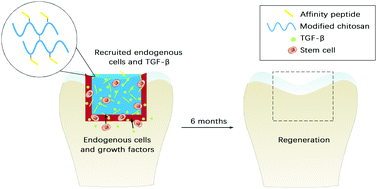当前位置:
X-MOL 学术
›
J. Mater. Chem. B
›
论文详情
Our official English website, www.x-mol.net, welcomes your
feedback! (Note: you will need to create a separate account there.)
TGF-β1 affinity peptides incorporated within a chitosan sponge scaffold can significantly enhance cartilage regeneration†
Journal of Materials Chemistry B ( IF 6.1 ) Pub Date : 2018-01-08 00:00:00 , DOI: 10.1039/c7tb02132a Jiaqing Chen 1, 2, 3, 4, 5 , Yijiang Li 1, 2, 3, 4, 5 , Bin Wang 4, 5, 6, 7 , Jiabei Yang 1, 2, 3, 4, 5 , Boon Chin Heng 5, 8, 9, 10, 11 , Zheng Yang 12, 13, 14, 15, 16 , Zigang Ge 1, 2, 3, 4, 5 , Jianhao Lin 4, 5, 6, 7
Journal of Materials Chemistry B ( IF 6.1 ) Pub Date : 2018-01-08 00:00:00 , DOI: 10.1039/c7tb02132a Jiaqing Chen 1, 2, 3, 4, 5 , Yijiang Li 1, 2, 3, 4, 5 , Bin Wang 4, 5, 6, 7 , Jiabei Yang 1, 2, 3, 4, 5 , Boon Chin Heng 5, 8, 9, 10, 11 , Zheng Yang 12, 13, 14, 15, 16 , Zigang Ge 1, 2, 3, 4, 5 , Jianhao Lin 4, 5, 6, 7
Affiliation

|
Growth factors, such as TGF-β and BMPs, play key roles in the chondrogenic differentiation of mesenchymal stem cells (MSCs) and cartilage regeneration in vivo. Nevertheless, there are some technical challenges in delivering exogenous growth factors in vivo, such as burst release and loss of bioactivity. In this study, TGF-β1 affinity peptides were incorporated within porous chitosan scaffolds to enhance cartilage regeneration. Significant upregulation of gene expression levels of Sox9, Col II and AGG during chondrogenic differentiation of MSCs in vitro, were positively correlated with increasing amounts of TGF-β1 affinity peptides incorporated within the chitosan scaffolds. The results of ectopic implantation of scaffolds in nude mice showed that incorporation of TGF-β1 affinity peptides and preloading of TGF-β1 synergistically enhanced ectopic cartilage formation at both high and low cell densities. Furthermore, in a rabbit osteochondral defect model, implantation of chitosan scaffolds incorporated with TGF-β1 affinity peptides (CHI-PEP) could significantly promote cartilage regeneration, even in the absence of exogenous growth factors and seeded cells. Notably, inflammation and cartilage degeneration were markedly alleviated in the CHI-PEP group. Hence, incorporation of TGF-β1 affinity peptide within the chitosan sponge scaffold significantly enhanced articular cartilage regeneration.
中文翻译:

壳聚糖海绵支架中掺入的TGF-β1亲和肽可显着增强软骨再生†
TGF-β和BMPs等生长因子在间充质干细胞(MSCs)的软骨形成分化和体内软骨再生中起关键作用。然而,在体内递送外源性生长因子仍存在一些技术挑战,例如爆发释放和生物活性丧失。在这项研究中,将TGF-β1亲和肽掺入多孔壳聚糖支架中以增强软骨再生。MSC的软骨分化期间Sox9的,柱II和AGG的基因表达水平的上调显著体外与壳聚糖支架内掺入的TGF-β1亲和力肽的增加呈正相关。裸鼠异位支架植入的结果表明,在高和低细胞密度下,TGF-β1亲和肽的掺入和TGF-β1的预加载均协同增强了异位软骨的形成。此外,在兔骨软骨缺损模型中,即使没有外源生长因子和种子细胞,植入结合有TGF-β1亲和肽(CHI-PEP)的壳聚糖支架也可以显着促进软骨再生。值得注意的是,CHI-PEP组的炎症和软骨变性明显减轻。因此,在壳聚糖海绵支架中掺入TGF-β1亲和肽显着增强了关节软骨的再生。
更新日期:2018-01-08
中文翻译:

壳聚糖海绵支架中掺入的TGF-β1亲和肽可显着增强软骨再生†
TGF-β和BMPs等生长因子在间充质干细胞(MSCs)的软骨形成分化和体内软骨再生中起关键作用。然而,在体内递送外源性生长因子仍存在一些技术挑战,例如爆发释放和生物活性丧失。在这项研究中,将TGF-β1亲和肽掺入多孔壳聚糖支架中以增强软骨再生。MSC的软骨分化期间Sox9的,柱II和AGG的基因表达水平的上调显著体外与壳聚糖支架内掺入的TGF-β1亲和力肽的增加呈正相关。裸鼠异位支架植入的结果表明,在高和低细胞密度下,TGF-β1亲和肽的掺入和TGF-β1的预加载均协同增强了异位软骨的形成。此外,在兔骨软骨缺损模型中,即使没有外源生长因子和种子细胞,植入结合有TGF-β1亲和肽(CHI-PEP)的壳聚糖支架也可以显着促进软骨再生。值得注意的是,CHI-PEP组的炎症和软骨变性明显减轻。因此,在壳聚糖海绵支架中掺入TGF-β1亲和肽显着增强了关节软骨的再生。











































 京公网安备 11010802027423号
京公网安备 11010802027423号